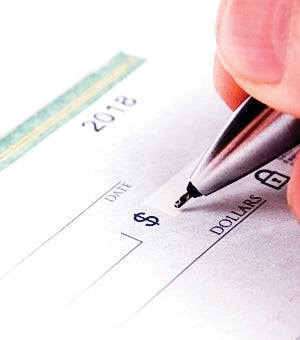Cassie H. Farmer has run the Family Financial Center, a Framingham check-cashing franchise, since October of 2007. These days, she says, people are coming in with smaller checks: paychecks for shorter hours since their employers have cut back staffing levels, unemployment checks instead of paychecks. But she said that decline is balanced by an increase in the total number of people using her company’s services.
Farmer said she thinks she’s getting new customers as some banks raise their fees. Other clients, facing tightening wallets, don’t want to wait three to seven days for a check to clear before they can get their money. And some have deficits in their checking accounts and can’t afford to see their paycheck disappear to help cover the negative balance.
“They need their money now,” Farmer said. “People are struggling right now in the midst of this economy, and we’re really seeing the effect of the lack of cash flow.”
Fees Vs. Fees
Farmer and others in the check-cashing world say their customers prefer them to banks for a variety of reasons in spite of the 2 to 2.5 percent charges they impose to cash a check. But many bankers say the vast majority of people could do better by using a checking account.
State figures don’t make a case for check cashing stores getting more or less popular in recent years, according to Jason Lefferts, communications director for the Massachusetts Office of Consumer Affairs and Business Regulation, which licenses the businesses. He said there’s been an upswing in licenses granted in recent years, but only because Wal-Mart started adding check cashing services at its stores in 2006. It’s not clear whether more people are using the services overall, he said. (Click here to see a list of all licensed check-cashers in Central Mass.)
JoAnn Morency, senior vice president of retail banking at Commerce Bank & Trust in Worcester, said Farmer’s not wrong that some banks are adding new fees, like charges when checking account balances drop below $100. But she said Commerce doesn’t do that. And she said the bank clears checks from the Northeast and Mid-Atlantic region in a day, and those from the rest of the country in two. With direct deposits from an employer, she said, money can actually be available even before paychecks are handed out.
Digital Federal Credit Union in Marlborough also offers completely free checking, according to spokesman John LaHair. He said some people who use check cashing stores rather than banks or credit unions are just not aware of the savings they’d see if they opened an account.
“We’re trying to be more proactive in educating potential members that they’d probably be better off not paying for services that can be obtained for free,” he said.
Denise Dobson-Shea, owner of Worcester CheckCashers Inc., said she’s seen efforts by some banks to draw away her customers, but she’s not convinced they offer a better deal. She said many people who come to her business are frustrated by various bank fees, including charges of $40 or $50 if they inadvertently write a bad check.
“I just think banks are way too expensive, and that’s why a lot of low-income people don’t even open accounts,” she said. “It’s just outrageous.”
Demographic Surprise
According to Farmer, it’s not just low-income people who use check cashing services either, especially given the current recession. She said she currently has four or five small businesses that use her services because their accounts are so tight they can’t wait for incoming checks to clear before paying their employees. And she said other customers regularly cash weekly paychecks of $1,000 or more, perhaps because even though they’re making decent money they’re not saving enough to keep a cushion in a bank account.
“I was a little surprised when I got in the business,” Farmer said. “I just had my thoughts about the people who would come in. I thought it would be the low-income people who live from paycheck to paycheck.”
Then, there are reasons for using check cashing stores that are not directly tied to fees. Both Farmer and Dobson-Shea said many of their customers don’t drive and so don’t have many banking options. Both also said they offer other services like money orders and bill-pay services, making them convenient for customers with multiple transactions to handle.
Meanwhile, banks and credit unions continue to make some efforts to make themselves more attractive to the “underbanked.” A group of financial institutions in Worcester meets regularly as the Alliance for Economic Inclusion, organized by the FDIC, to discuss ways to do that.
Kip Child, a community affairs specialist with the FDIC in Braintree who helps run the Alliance, said progress on the issue is happening, slowly. These days, he said, banks are flush with money that was pulled out of riskier investments after the markets crashed, but in future years he said that money will flow back out, and the underbanked will likely be a good source of new funds.
“There’s a lot of good avenues out there in the underserved markets,” he said.
For now, check cashing businesses continue to argue that banks aren’t doing enough to make then an attractive option for some customers.
“I’ve always had a bank account for my whole life,” said Dobson-Shea. “But you know, banks, they’re too expensive, they’re too much of a hassle. I almost feel that I shouldn’t have a bank account anymore. They’re too costly.”

